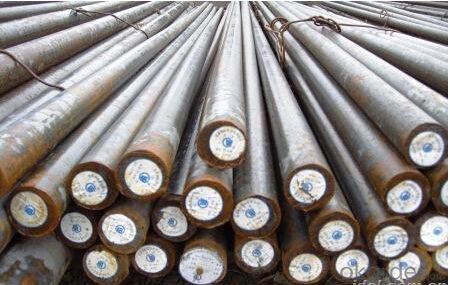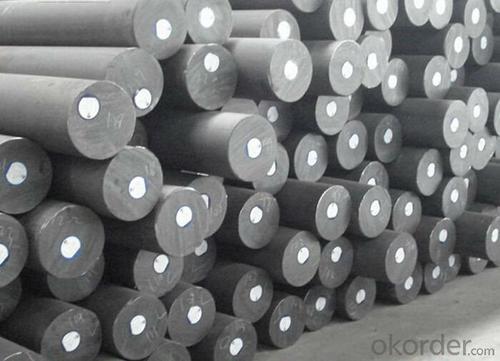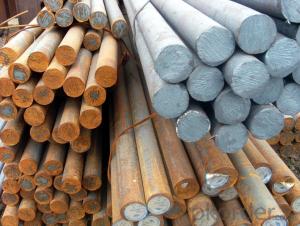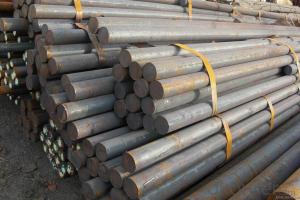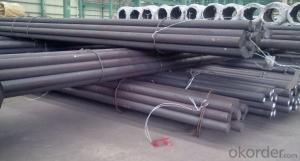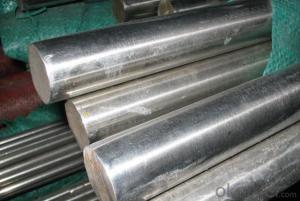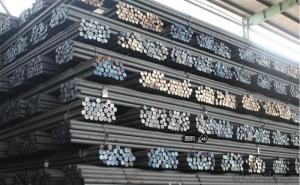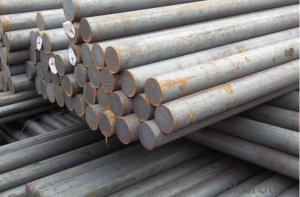Grade 30MnVS6 CNBM Forged Alloy Steel Round Bar
- Loading Port:
- Shanghai
- Payment Terms:
- TT or LC
- Min Order Qty:
- 3 m.t.
- Supply Capability:
- 10000 m.t./month
OKorder Service Pledge
OKorder Financial Service
You Might Also Like
Specification
Specification:
Standard:
Our products meet Chinese GB, Japanese JIS, US ASTM, UK BS, EU DIN standards and so on.
Round bar:
Diameter : 1mm-2000mm
Chemical Composition:
C | Si | Mn | P | S | Cr | Mo | N | V |
0,26 - 0,33 | 0,15 - 0,80 | 1,20 - 1,60 | max. 0,025 | 0,02 - 0,06 | max. 0,30 | max. 0,08 | 0,01 - 0,02 | 0,08 - 0,20 |
Usage and Applications:
Mainly used in automobile manufacturing for the part of crankshaft, linkage,steering knuckle, wheel hub, door butt and semi-axle shaft sleeve..etd.
Packaging & Delivery:
Packaging Detail: Standard seaworthy packing or as customer required; all goods are packed in bundle with steel strips and shipped by break bulk vessel or container
Delivery Detail: 45 days
Production Flow:
hot forging/hot rolling + annealing/normalizing + tempering/quenching + tempering/any conditions based on the customer's requirement
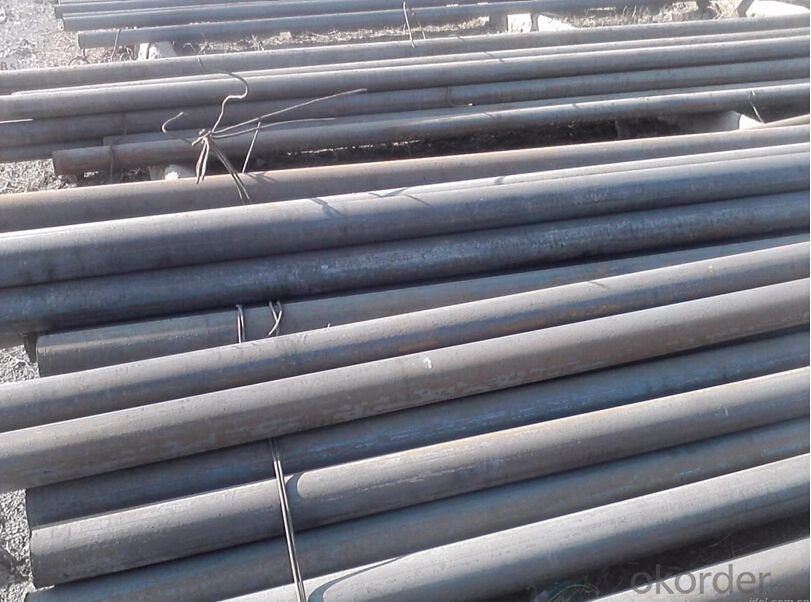
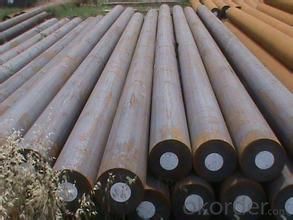
Quality Assurance:
1. We will strictly inspect our production that we sold according to the customer’s request.
2. Our steel reaches international quality standards.
3. Quality should be in conformity with the specification of the manufacturer. Quantity and packing conditions should be in conformity with the term in the contract.
4. Should the packing found damaged, the buyer has the right to claim to the seller
"Steel alloy in addition to iron, carbon, the addition of other alloy elements, called alloy steel. In the ordinary carbon steel on the basis of adding one or more moderate alloy and iron carbon alloy. The special properties of high strength, high toughness, wear resistance, corrosion resistance, low temperature resistance, high temperature resistance and non magnetism can be obtained according to the different adding elements.
Many kinds of alloy steel, usually alloy element content how many points for low alloy (content of less than 5%) and in (the content of 5% ~ 10%) steel, high alloy steel (content > 10%); according to the quality points according to the high-quality alloy steel, the characteristics of alloy steel; according to the characteristics and uses and alloy structure steel, stainless steel, acid resistant steel, wear-resistant steel, heat-resistant steel, alloy tool steel, rolling bearing steel, alloy spring steel and special properties of steel, such as soft magnetic, permanent magnetic steel, non-magnetic, etc..
In the process of steel making, manganese is a good agent for the removal of sulfur and sulfur, and manganese in steel is 0.50% to 0.30. In plain carbon steel to join more than 0.70% even manganese steel, than the average amount of steel of steel not only enough toughness and have higher strength and hardness, improve the quenching of steel, steel to improve the performance of thermal processing, such as 16Mn steel A3 than the yield point is up to 40% of. Wear resistance high manganese steel 11 - 14%, for the excavator bucket, ball mill liner. The increase of manganese content, reduce the corrosion resistance of steel, reduce the welding performance."
- Q: What are the different electroplating techniques used for special steel?
- There are several electroplating techniques used for special steel, including electroless nickel plating, zinc plating, and chromium plating. Each technique offers unique benefits and properties that are tailored to the specific requirements of the special steel being plated.
- Q: How does special steel contribute to the efficiency of automotive engines?
- Special steel plays a vital role in enhancing the efficiency of automotive engines in various ways. To begin with, it provides exceptional strength and durability, allowing for the production of lighter and more compact engine components. This reduction in weight contributes to increased fuel efficiency, as the engine requires less effort to propel the vehicle, resulting in improved performance and reduced emissions. Moreover, special steel possesses excellent properties of heat resistance and thermal conductivity. These characteristics are particularly important in automotive engines, which generate significant heat during operation. By incorporating special steel into critical engine parts such as cylinder heads, valves, and pistons, manufacturers can effectively manage the generated heat, preventing engine overheating and ensuring optimal performance. Additionally, special steel exhibits high resistance to wear, corrosion, and fatigue, making it an ideal choice for components exposed to high levels of stress and friction in automotive engines. This enhanced durability translates into a longer engine lifespan, reduced maintenance costs, and improved reliability. Furthermore, the use of special steel allows for the production of more precise and intricate engine designs. Its superior machinability enables the creation of complex shapes and structures, optimizing airflow and combustion within the engine. This leads to improved fuel combustion efficiency, power output, and overall engine performance. In conclusion, the contribution of special steel to the efficiency of automotive engines cannot be underestimated. Its properties of strength, heat resistance, durability, and machinability enable the production of lighter, more durable, and high-performing engine components. By integrating special steel into automotive engines, manufacturers can achieve enhanced fuel efficiency, reduced emissions, longer engine lifespan, and improved overall performance.
- Q: What are the different tool steel alloys?
- Tool steel, a type of steel containing carbon and alloy, is specifically designed for producing tools, dies, and cutting applications. There are various tool steel alloys available, each possessing unique properties and characteristics. 1. Carbon Tool Steels: These steels have a higher carbon content, typically ranging from 0.60% to 1.00%. They provide excellent hardness, wear resistance, and toughness, rendering them suitable for cutting and forming tools. 2. High-Speed Tool Steels: These steels are engineered to endure high temperatures while maintaining their hardness and strength at elevated speeds. They usually contain alloying elements like tungsten, molybdenum, and vanadium. 3. Shock-Resistant Tool Steels: These steels are specially formulated to withstand high impact or shock loads without fracturing. They offer exceptional toughness and are frequently utilized for chisels, hammers, and other tools subjected to intense impact forces. 4. Hot-Work Tool Steels: These steels are designed to retain their hardness and strength at high temperatures, making them ideal for applications involving hot forming or forging processes. They exhibit outstanding thermal conductivity and wear resistance. 5. Cold-Work Tool Steels: These steels are specifically designed for applications involving cutting, shearing, and forming at room temperature or lower. They possess high hardness, wear resistance, and toughness, enabling them to withstand the stresses associated with cold-working operations. 6. Mold Steels: Mold steels are primarily used in the production of molds for plastic injection molding, die casting, and extrusion processes. They offer good machinability, high wear resistance, and excellent dimensional stability. 7. Stainless Tool Steels: Stainless tool steels combine the corrosion resistance of stainless steel with the hardness and toughness of tool steel. They are commonly used in applications where both wear resistance and corrosion resistance are required. These examples represent just a fraction of the tool steel alloys available in the market. Each alloy possesses distinct properties and applications, enabling manufacturers to select the most suitable tool steel for their specific requirements.
- Q: What are the different nuclear grades of special steel?
- There are several nuclear grades of special steel, including but not limited to A508 Class 1, A533 Type B Class 1, A533 Type B Class 2, A508 Class 2, A533 Type C Class 1, A508 Class 3, and A533 Type C Class 2. These grades are specifically designed to meet the stringent requirements of nuclear power plant applications, ensuring high strength, resistance to radiation damage, and excellent fracture toughness.
- Q: What are the requirements for special steel used in mining equipment?
- Special steel used in mining equipment needs to possess certain key requirements. Firstly, it must have high strength and toughness to withstand the harsh and demanding conditions present in mining operations. It should also exhibit excellent wear resistance to endure the abrasive nature of rocks and minerals. Additionally, corrosion resistance is crucial to prevent the steel from deteriorating due to exposure to water, chemicals, and other corrosive substances commonly found in mining environments. Finally, the special steel used in mining equipment should be capable of maintaining its mechanical properties at elevated temperatures, as mining processes often involve high heat generation. Overall, the requirements for special steel in mining equipment revolve around durability, wear resistance, corrosion resistance, and heat resistance.
- Q: How is the quality of special steel ensured?
- The quality of special steel is ensured through a combination of rigorous testing, strict quality control measures, and adherence to international standards and specifications. Special steel producers employ various methods such as chemical analysis, mechanical testing, and non-destructive testing to verify the composition, strength, and integrity of the steel. Additionally, special steel manufacturers often have dedicated quality assurance teams that closely monitor the production process to identify any potential issues and ensure the final product meets the required specifications.
- Q: How is special steel used in toolmaking?
- Due to its exceptional properties, special steel is widely utilized in toolmaking to create durable and high-performance tools. Various tools, including drills, saws, cutting tools, dies, and molds, are manufactured in toolmaking. The purpose of incorporating special steel in toolmaking is to guarantee that these tools possess the necessary strength, hardness, toughness, and wear resistance needed for their intended applications. The primary advantage of special steel in toolmaking is its high strength. This is achieved by alloying special steel with elements such as chromium, molybdenum, vanadium, and tungsten, which enhance its strength and hardness. Consequently, the tools can endure heavy loads, resist deformation, and maintain their structural integrity even under extreme working conditions. In addition to strength, special steel also exhibits excellent hardness. Heat treatment processes like quenching and tempering are applied to tools made from special steel to achieve the desired hardness level. This hardness is crucial in toolmaking as it allows the tools to efficiently cut, drill, or shape various materials without succumbing to damage or wear easily. Furthermore, special steel possesses exceptional toughness. Toughness refers to a material's ability to absorb energy and resist cracking or fracturing. Tools made from special steel can withstand impact and heavy loads, ensuring that they remain intact and do not chip easily during use. This is of utmost importance in toolmaking as tools often encounter high-stress situations where toughness is essential to prevent premature failure. Another significant advantage of special steel in toolmaking is its excellent wear resistance. Constant friction, abrasion, and contact with hard materials subject tools to wear and tear. Special steel is designed specifically to resist wear, allowing the tools to maintain their cutting or shaping abilities over prolonged periods. Consequently, the tool's lifespan is extended, ensuring consistent performance and high-quality output. Special steel is also renowned for its corrosion resistance, which is advantageous in toolmaking, especially when working with corrosive materials or in harsh environments. The inclusion of certain elements like chromium in special steel enhances its resistance to corrosion, preventing rust and deterioration of the tools. In conclusion, special steel is an indispensable material in toolmaking as it provides the necessary strength, hardness, toughness, wear resistance, and corrosion resistance. These properties enable tools to perform effectively and efficiently, ensuring durability and longevity. Whether it is for cutting, drilling, shaping, or molding, special steel is essential in producing high-quality tools that meet the demands of various industries.
- Q: How is special steel used in the medical manufacturing process?
- Special steel is used in the medical manufacturing process for a variety of applications, including the production of surgical instruments, implants, and medical devices. The unique properties of special steel, such as its corrosion resistance, biocompatibility, and strength, make it ideal for creating high-quality and durable medical products. Additionally, special steel can be easily sterilized, ensuring the safety and hygiene of medical equipment.
- Q: How does special steel perform in renewable energy applications?
- Various renewable energy applications heavily rely on special steel, which plays a crucial role in their performance and durability. The exceptional properties of special steel, including its high strength, resistance to corrosion, and stability in different temperatures, make it an ideal choice for use in renewable energy technologies. Wind turbines, in particular, benefit greatly from special steel. The tower, rotor blades, and gearbox of wind turbines require materials that can withstand harsh environmental conditions and bear high mechanical loads. Special steel alloys excel in this aspect by offering excellent strength-to-weight ratios, enabling the design of lighter and more efficient turbines. Additionally, their resistance to corrosion ensures a longer lifespan and reduced maintenance needs, ultimately enhancing the reliability and overall performance of wind turbines. In solar power applications, special steel finds its use in the construction of solar panels and their support structures. Solar panels demand frames made of durable materials to withstand external forces and extreme weather conditions. By utilizing special steel, solar panels can be manufactured to be lightweight while maintaining the necessary strength to support the weight of photovoltaic cells. Moreover, the corrosion resistance of special steel ensures the panels remain intact even in harsh environments. Furthermore, special steel is also employed in hydroelectric power production. The corrosive nature of water, coupled with high pressure and temperature conditions, necessitates the use of materials that can withstand such environments. Special steel exhibits excellent resistance against corrosion, erosion, and cavitation, making it an ideal choice for hydroelectric power generation. Its strength and durability ensure efficient operation and the ability to withstand the forces exerted by flowing water. All in all, special steel significantly enhances the reliability, longevity, and efficiency of various renewable energy technologies. Its unique properties make it an essential material in wind turbines, solar panels, and hydroelectric power generation, thereby contributing to the overall progress and sustainability of renewable energy systems.
- Q: How is tool steel different from other types of special steel?
- Tool steel is a specific type of special steel that is specifically designed for creating tools and dies. Unlike other types of special steel, tool steel is known for its exceptional hardness, resistance to wear, and ability to hold a sharp edge under high temperatures. This makes it ideal for applications such as cutting, drilling, and shaping materials. Tool steel also typically contains higher amounts of carbon and other alloying elements to enhance its strength and durability, distinguishing it from other types of special steel.
Send your message to us
Grade 30MnVS6 CNBM Forged Alloy Steel Round Bar
- Loading Port:
- Shanghai
- Payment Terms:
- TT or LC
- Min Order Qty:
- 3 m.t.
- Supply Capability:
- 10000 m.t./month
OKorder Service Pledge
OKorder Financial Service
Similar products
Hot products
Hot Searches
Related keywords


